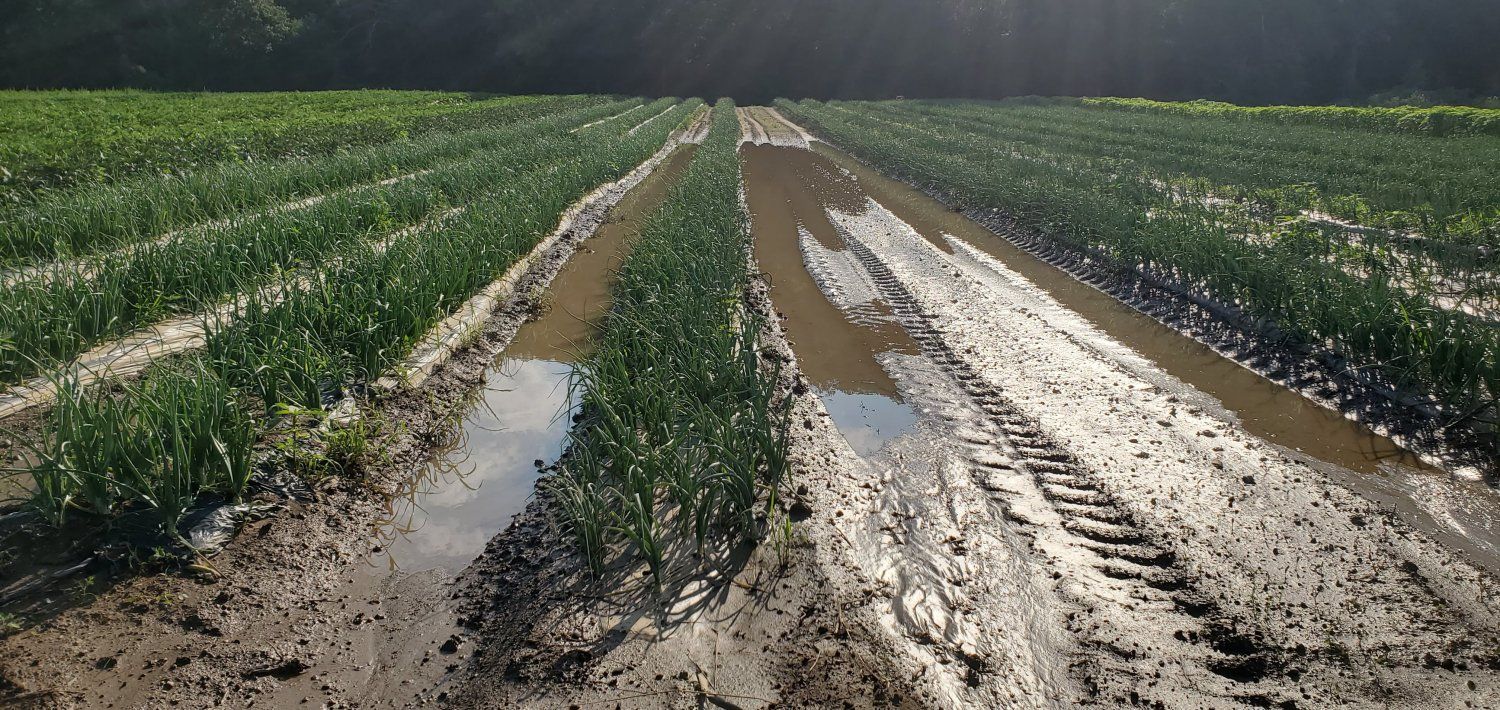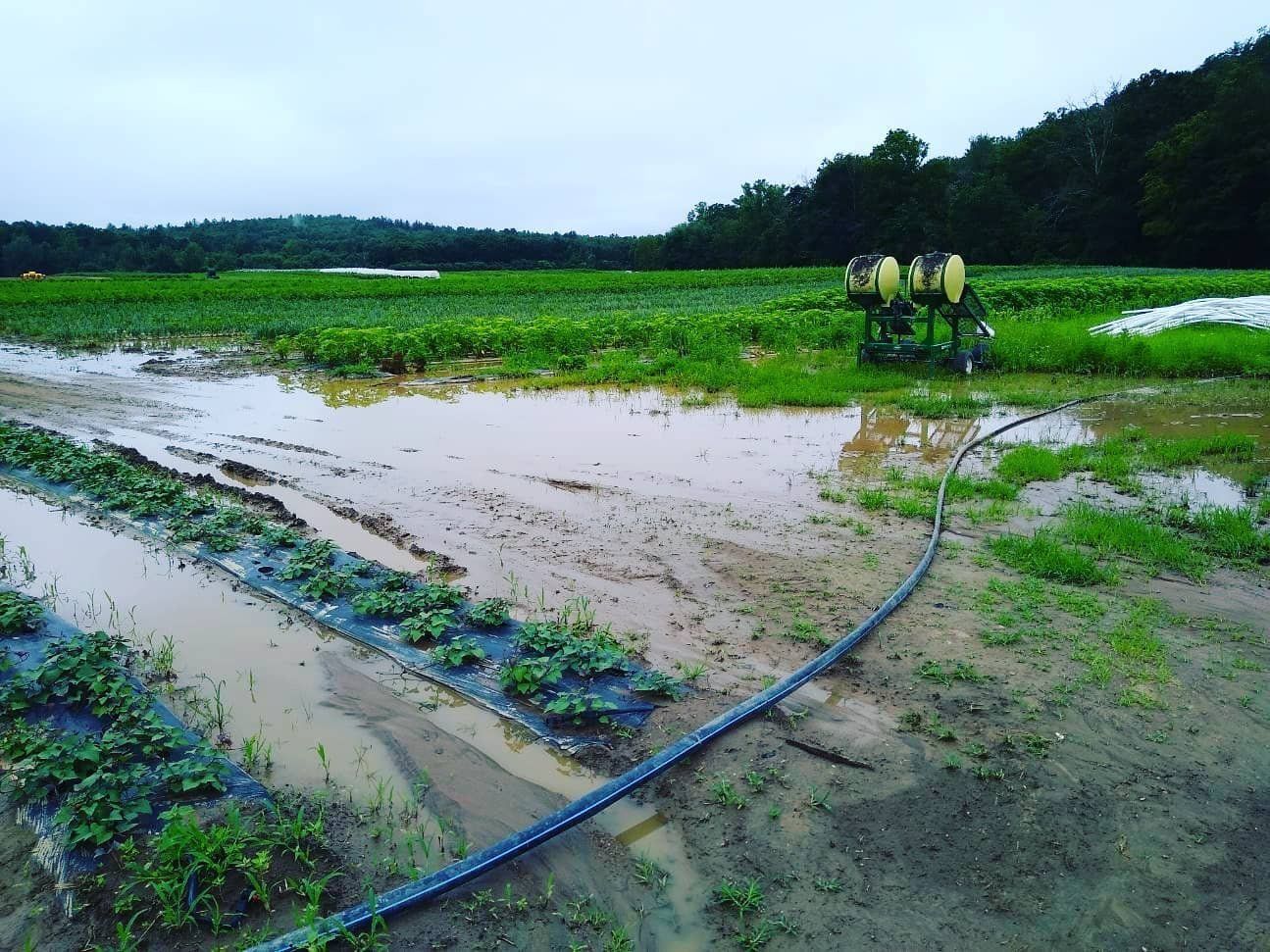From May with almost no rain, to 12+ inches in the last 10 days, what wild swings of weather we have had this season! The standing water has begun to subside in most of the fields and we are back to work transplanting and weeding crops that will be coming along later in the season. Green beans are coming soon, kohlrabi and cabbages are filled out and peppers are getting heavy on the plants. The tunnel covers over the rows of heirloom tomatoes will hopefully stave off the rain-borne fungal diseases and we might even see some red tomatoes in another week or two.
.jpg)

The honey bees that are staying in our fields for the summer have been enjoying the cucumber and squash blossoms as they work. We are excited to offer their honey as an Extra that you can buy during the share customization period this week! The heavy rains have kept them from flying far on some days but there's a lot of wildflowers and trees on the edges of our fields to keep them well fed even when they aren't able to fly too far from their hives. We farmers work with the swings of weather as best we can, with as many strategies as we can, since ultimately it is not something we can control, but hope to manage.

One thing over which we have gained better control during the past few seasons is the predation of our greenhouse seeds by rodents. In other words, we have found a few ways to keep those blasted chipmunks and mice from eating our seeds before they sprout. In some years, when we have warm relatively dry soil by June, we can sow the winter squash and successive plantings of cucumbers, melons and summer squash directly into the open fields. We have had good luck seeding a lot of winter squash directly this year, but the pest pressure on young emerging plants has been particularly intense.

As we use only untreated and organic seeds, they are susceptible to rotting before they germinate if the ground is cool and wet (as well as being vulnerable to the birds, field mice and aforementioned chipmunks) and in past years the results of directly sewn seeds have been rather disappointing. So we hedge our bets and try to get as many of them as we can them started in the greenhouse before transplanting out into the fields.
As soon as we finish planting the seeds into the soil-filled trays in the greenhouse, we cover them with empty inverted trays and weigh them down so that the chipmunks cannot sneak underneath and eat the seeds. The trays have to be uncovered and recovered (taking considerable time and effort) each time they are watered until they begin to germinate, at which point the chipmunks will generally leave them alone. If the plants are covered for too long after they sprout, the light-seeking seedlings can get spindly as they try to grow out to the light, and then will be difficult to transplant.


Recently however, the chipmunks seem to have cross-bred with some super-powered weasel perhaps and have managed to chew through the thick plastic sides of the trays and get to the seeds that way before they emerge. They can't get all of them, but have put a damper on our previously successful strategy.

So we continue to plant, transplant and directly seed, working as hard as we can to ensure we have an abundant crop of melons, cucumbers, summer and winter squash. There is plenty of good news though. The planted watermelons have some tiny fruits, peppers and eggplants have plenty of leafy branches to shield their developing fruits from damaging sunburn, and the sweet potato slips are leafing and vining out across the field in a beautiful way.
Some of the produce you receive today has been rinsed from the field, but like all fresh produce, should be thoroughly washed and often, refrigerated by you at home.
REMINDER: Flower and bouquet shares will start this week for those who have purchased them! Please note if you have an Every Other Week veggie share, that you will need to come each week for your flowers while they are in season, but just grab your veggies on the same biweekly schedule you are already on. Further details about flower and bouquet shares will come to shareholders in a separate email.






